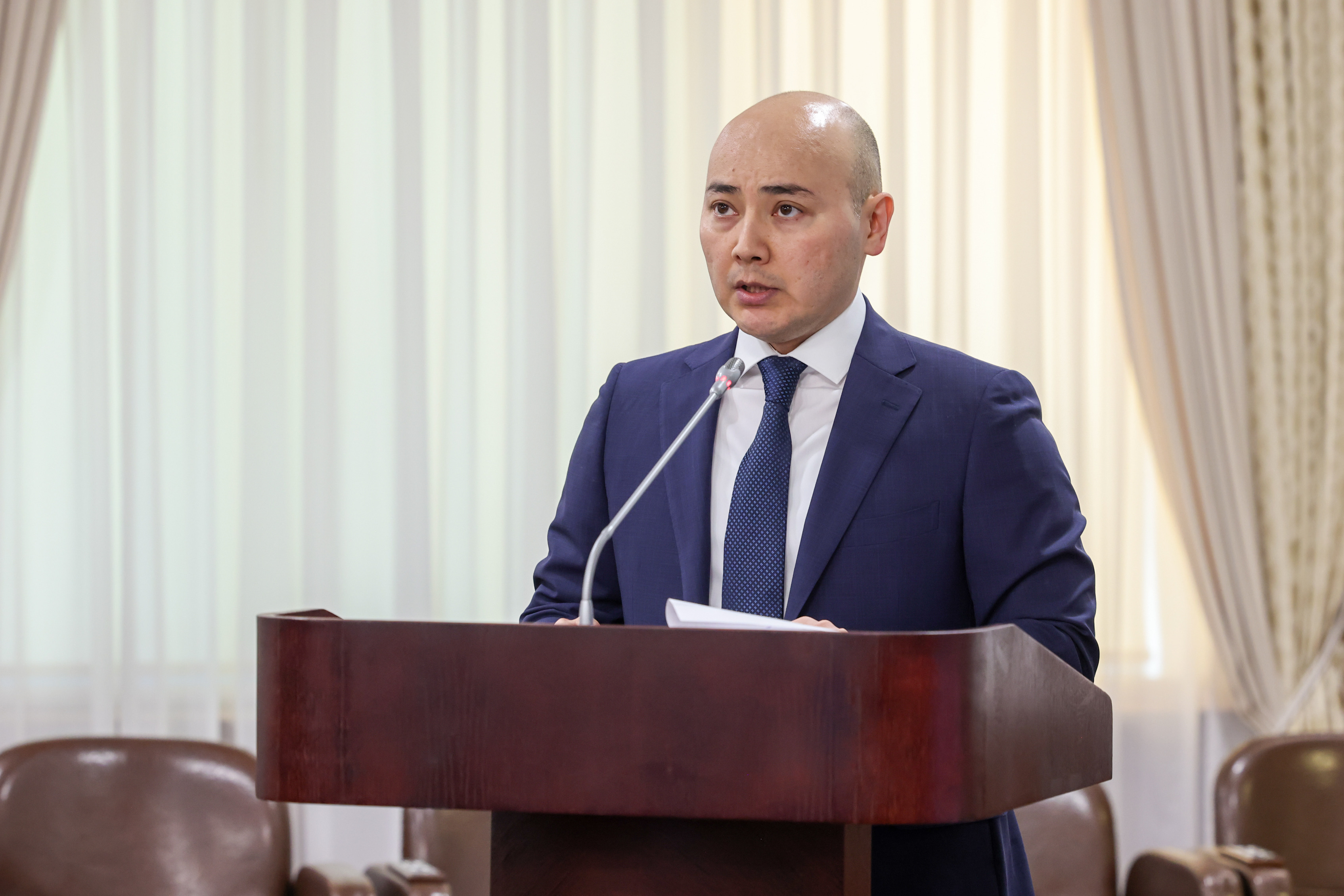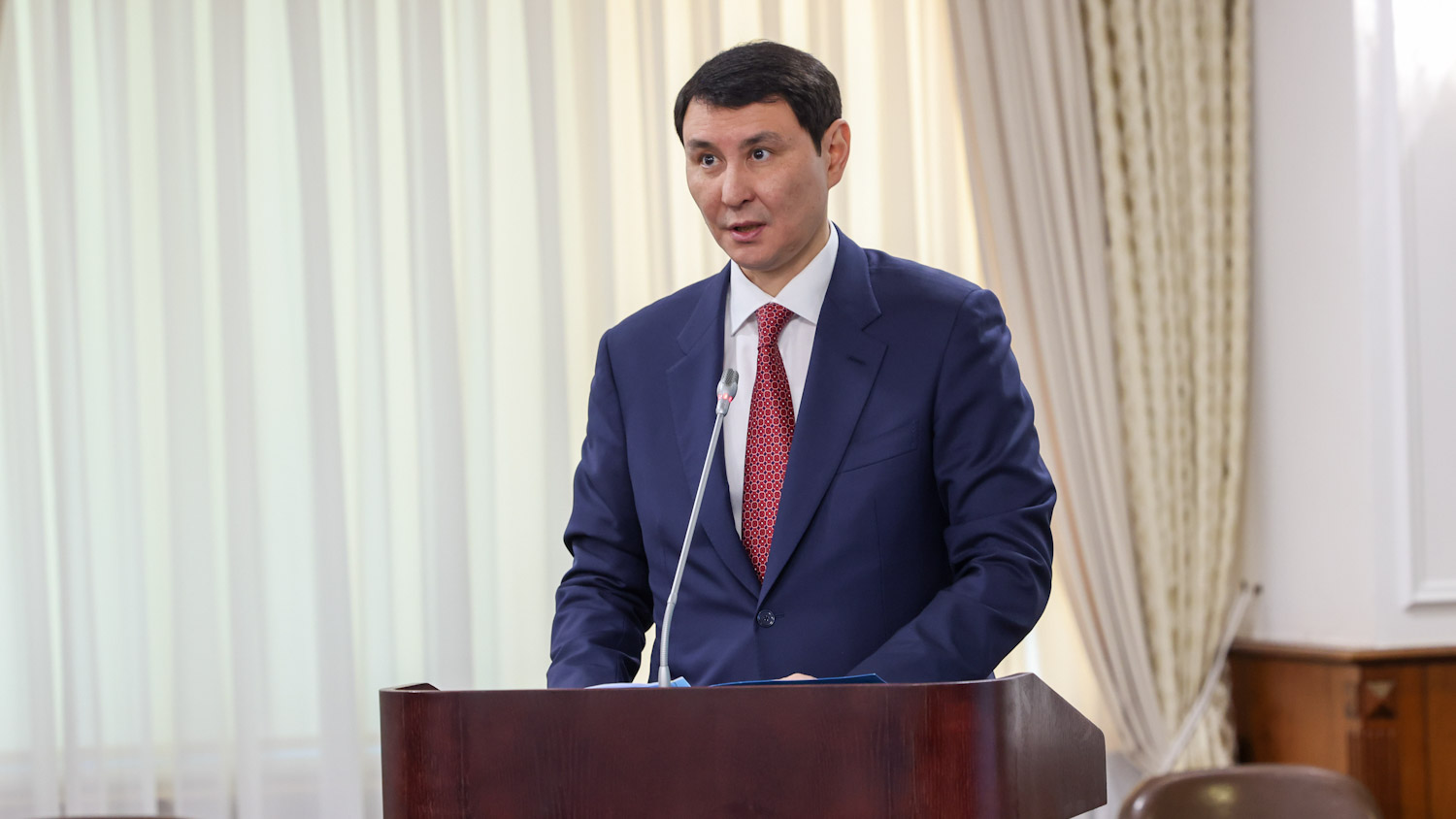16 May 2023, 11:46
 At the Government session, chaired by Prime Minister Alikhan Smailov, the results of socio-economic development and execution of the republican budget for January-April of this year were considered. Reports were made by Deputy Prime Minister - Minister of Finance Yerulan Zhamaubayev, Minister of National Economy Alibek Kuantyrov and Deputy Chairman of the National Bank of Kazakhstan Vitaliy Tutushkin.
At the Government session, chaired by Prime Minister Alikhan Smailov, the results of socio-economic development and execution of the republican budget for January-April of this year were considered. Reports were made by Deputy Prime Minister - Minister of Finance Yerulan Zhamaubayev, Minister of National Economy Alibek Kuantyrov and Deputy Chairman of the National Bank of Kazakhstan Vitaliy Tutushkin.
This year Kazakhstan's economy grew by 5% compared to January-April last year, National Economy Minister Kuantyrov said. Among them, the real sector grew by 4.8% and the service sector by 4.9%.
All of the main sectors are showing positive growth, with construction, trade and information and communication showing the strongest growth.
The growth rate of investment in fixed assets was 18%.
Investment inflows rose in transport and storage by 39.3%, in agriculture by 26.5%, in real estate by 10% and in industry by 18.1%, including mining by 17.3% and manufacturing by 7%.
Regionally, the best indicators are in Turkestan, Mangistau, Kyzylorda and West Kazakhstan regions.
According to preliminary results for January-March 2023, foreign trade turnover rose by 13.4% to $32.7bn.
Exports amounted to $18.7 billion, with exports of processed goods up 8.1% to $5.9 billion. Imports of goods totaled $14 billion.
Overall, the trade surplus was $4.8 billion. The manufacturing industry maintained a positive growth rate. Output grew by 5.1%.
Positive growth was recorded in 16 regions. The largest increase is observed in Kostanay, North Kazakhstan regions, Abay region, as well as in the city of Almaty.
"Production in the mining industry increased by 2%. At the same time, gas production increased by 4.4%, oil production by 3.2% and other minerals extraction by 20.6%. The mining of metal ores decreased by 0.8%, mining services decreased by 1.9%, and coal production decreased by 9.9%. The volume of construction work carried out increased by 15.4%. Positive dynamics was recorded in all regions, with the highest growth of construction and installation works noted in the region of Abay, Zhambyl, Kyzylorda and Mangystau regions," Kuantyrov informed.
In January-April of this year more than 4.3 million sq. m of housing was commissioned, which is 20% more than in the same period last year. The highest rates of housing commissioning are observed in the cities of Almaty, Shymkent and Astana, as well as in Almaty region.
In agriculture, gross output increased by 3.6%. Positive production growth in the sector was recorded in all regions. The Mangystau, East Kazakhstan, Akmola and West Kazakhstan regions showed the highesty growth.
For all indicators, positive growth is observed in 10 regions , such as Abay, Ulytau and Zhetysu regions, as well as Akmola, West Kazakhstan, Kostanay, Kyzylorda, Pavlodar, North Kazakhstan regions, and Almaty city.
In order to ensure further economic growth, central and local governments are encouraged to focus in the short term on:
In turn, Deputy Governor of the National Bank of Kazakhstan Vitaliy Tutushkin said that positive trends in global markets remained in April 2023. However, the outlook for the global economy remains sensitive to high uncertainty amid challenges to financial stability, high inflation rates and the continuing impact of geopolitical conflicts.
Global economic growth accelerated further at the start of the second quarter of 2023. In Kazakhstan, business activity remained in positive territory at 51.2 in April, despite a slight slowdown. The deceleration was influenced by a move of the manufacturing index into negative territory at 49.6 as well as a slowdown to 50.4 in construction. An improvement was recorded in the services sector at 52.
In April this year, the IMF lowered its forecast for global economic growth to 2.8%, despite upward revisions to forecasts in the USA and the EU. China and India will make a significant contribution to global growth.
For Kazakhstan's trading partners, the IMF revised upward the economic growth forecast for 2023: for the Eurozone from 0.7% to 0.8% and for Russia from 0.3% to 0.7%. For China, the forecast was kept at 5.2%. GDP growth in Kazakhstan is forecast at 4.3% by the IMF.
Inflation in Kazakhstan, after peaking at an annual rate of 21.3% in February this year, continued to slow to 16.8% in April, in line with the National Bank's forecasts. Food prices continue to make the biggest contribution. At the same time their year-on-year growth slowed to 17.9%. Inflation of paid services also slowed down to 13.7%. The annual price index for non-food goods was 18.2%.
Despite the slowdown in annual inflation, monthly inflation remains volatile and is still above April's 2017-2021 average. Domestic pro-inflationary factors remain and are starting to materialise in the form of unstable inflation expectations, continued increases in government spending as well as the initiation of the overdue reforms in the fuel and utilities markets. The combined balance of factors makes it necessary to maintain the base rate of the National Bank at 16.75% during the first half of 2023 in order to reduce inflation in the medium term. Further action on the base rate will depend on an updated forecast in May, taking into account new data.
From the beginning of the year to the end of April, the tenge appreciated against the US dollar by 2% to KZT453.21 per US dollar. The National Bank did not intervene in the exchange rate.
The appreciation of the national currency since the beginning of the year is due to several factors. Firstly, tenge instruments remain attractive, both domestically and to non-residents. Thus, the level of dollarisation of deposits has fallen from 31.6% in December 2022 to 29.3% in March. The inflow of foreign investors into Kazakhstan's government securities increased by 126 billion tenge.
Second, the January-April support for the tenge came from $1.3 billion in foreign exchange sales by quasi-public sector entities and $2.1 billion in foreign exchange sales to support transfers from the NF to the RB.
In the short term, the tenge dynamics will depend on the expectations of market participants, the situation on global markets and changes in the geopolitical situation.
The National Bank will continue to maintain a flexible exchange rate regime, which prevents the accumulation of imbalances and ensures the safety of international reserves.
The National Bank's foreign exchange reserves increased by $1.5bn to $37.6 billion as a result of higher gold prices and increased funds in the government's accounts in April.
Assets of the National Fund increased by 0.5% to $58.7bn in April due to an increase in the value of the equity portfolio.
In order to allocate transfers from the National Fund to the national budget in the amount of 393 billion in April sold assets of the National Fund for $ 600 million or 271 billion in tenge equivalent. Total receipts to the fund last month amounted to 292 billion tenge.
UNPF's pension assets stood at 15.7 trillion tenge at the end of April, up by 1 trillion tenge or 7.2% YTD.
The volume of investment income since the beginning of this year amounted to 482 billion tenge, pension contributions 664 billion tenge, pension payments about 82 billion tenge, early withdrawals 47 billion tenge.
 According to Deputy Prime Minister - Minister of Finance Yerulan Zhamaubayev, the state budget received 6.1 trillion tenge or the plan was fulfilled by 104.6%. The republican budget received 4 trillion tenge of revenues. The plan was fulfilled by 92.3% or the non-fulfillment amounted to 336 billion tenge. Failure to meet the plan on taxes by 369 billion tenge was mainly due to CIT, ETP on crude oil and VAT.
According to Deputy Prime Minister - Minister of Finance Yerulan Zhamaubayev, the state budget received 6.1 trillion tenge or the plan was fulfilled by 104.6%. The republican budget received 4 trillion tenge of revenues. The plan was fulfilled by 92.3% or the non-fulfillment amounted to 336 billion tenge. Failure to meet the plan on taxes by 369 billion tenge was mainly due to CIT, ETP on crude oil and VAT.
"The failure to fulfil the CIT plan was due to a 33% decrease in the amount of declared advance payments for the 4 months of 2023 for 258 large taxpayers compared to the same period last year. The failure to fulfil the CIT plan was also caused by a 12% drop in the prices of the main export commodities on average. The main non-fulfillment of the plan on ETP for crude oil is due to a 15% decrease in the actual ETP rate from the forecast," Zhamaubayev said.
The reasons for not fulfilling the VAT plan are:
Revenues of local budgets were fulfilled by 140% and amounted to 2 trillion 123 billion tenge. The plan was exceeded by 607 billion tenge, including taxes by 565 billion tenge. Revenue plans have been exceeded in all regions.
State budget expenditures were 98.6% executed, national budget expenditures were 99% executed and local budgets 98.6% executed. Expenditures on the national budget amounted to 7 trillion tenge. The shortfall was 72 billion tenge, of which 16 billion tenge were savings.
The main reasons for non-implementation are: lengthy procedures for concluding contracts, supplementary agreements; payments made for actual services rendered; lengthy tendering procedures; late submission of certificates of completed work, invoices, etc.
Local budget expenditures amounted to 3.3 trillion Tenge. This year, targeted transfers of about 2 trillion Tenge are envisaged to the regions.
As of May 1, they were allocated 473 billion tenge. Of this, 97% has been disbursed.
In the first four months of 2023, cameral control covered more than 175,000 public procurement procedures worth about 5 trillion Tenge, Zhamaubayev said.
"As a result of the audits, breaches in 26,836 procedures were identified, of which 90% of the notices to rectify breaches were executed by the state audit objects. 684 audits were conducted. The audits covered about 303 billion tenge of budgetary funds.Financial violations amounting to about 46 billion tenge were established. Violations were eliminated in the amount of 31 billion tenge by restoring the supply of goods, services and works, reimbursement to the budget and recording in the accounting. 692 recommendations were given to improve and enhance the effectiveness of the audited objects," Zhamaubayev informed.
The Comprehensive Privatisation Plan for 2021-2025 provides for the sale of 669 facilities. During the reporting period, 368 facilities worth 312 billion tenge were sold and transferred for trust management with the right to subsequent redemption. 33 objects are under auctions. 62 objects were sent for reorganization and liquidation. 206 properties are in pre-sale preparation.
#Budget Policy #Economy #Finance #Government sessionStay updated about the events of the Prime minister and the Government of Kazakhstan - subscribe to the official Telegram channel
Subscribe